
INTERNATIONAL JOURNAL OF APPROXIMATE REASONING
metrics 2024
Leading the Charge in High-Impact Research
Introduction
The INTERNATIONAL JOURNAL OF APPROXIMATE REASONING, published by Elsevier Science Inc, stands as a pivotal resource in the domains of applied mathematics and artificial intelligence. Since its inception in 1987, the journal has evolved into a leader in its field, boasting an impressive impact factor and ranking within the top quartile for applied mathematics (Q1) and high standings in artificial intelligence and software categories according to the 2023 Scopus rankings. As researchers, professionals, and students delve into complex issues surrounding reasoning under uncertainty, this journal provides invaluable insights and cutting-edge research. In addition to its rich content, the journal's commitment to advancing knowledge in theoretical computer science further enhances its significance in fostering academic growth. While the journal does not currently offer open access, its rigorous peer-review process ensures that only high-quality, impactful studies are published, solidifying its role as an essential source for academics striving to remain at the forefront of their fields.
Metrics 2024
 0.88
0.88 3.20
3.20 3.20
3.20 112
112Metrics History
Rank 2024
Scopus
IF (Web Of Science)
JCI (Web Of Science)
Quartile History
Similar Journals
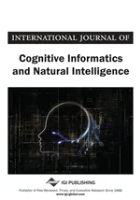
International Journal of Cognitive Informatics and Natural Intelligence
Fostering Collaborative Insights in Cognitive TechnologiesThe International Journal of Cognitive Informatics and Natural Intelligence, published by IGI Global, is an essential resource for researchers and professionals exploring the intersections of cognitive informatics, artificial intelligence, and human-computer interaction. Since its establishment in 2007, this journal has focused on advancing the understanding of cognitive systems and their applications in natural intelligence, contributing significantly to the fields of software engineering and interface design. Operating out of the United States, the journal aims to disseminate high-quality research and innovative methodologies to foster interdisciplinary collaboration. Despite its current standing in Q4 quartiles for the fields of Artificial Intelligence, Human-Computer Interaction, and Software, it serves as a vital platform for emerging scholars and seasoned professionals alike seeking to explore new frontiers in cognitive technologies. While it does not provide direct open access, these publications are instrumental in shaping academic discourse, and contribute to ongoing advancements in how we understand and integrate cognitive science into practical applications.

Information
Leading the charge in information technology advancements.Information is a distinguished open-access journal published by MDPI since 2010, dedicated to advancing the field of Information Systems. With its E-ISSN 2078-2489, the journal serves as a crucial platform for researchers, professionals, and students to disseminate and access innovative research and methodologies in the domain of information science, data management, and technology. Based in Basel, Switzerland, the journal has established a commendable reputation in the academic community, currently holding a Q2 ranking in the prestigious Scopus category of Information Systems, and occupies the 74th percentile among its peers. The breadth of the journal's objectives is to promote and facilitate the open exchange of ideas, research findings, and emerging trends, fostering collaboration and knowledge growth in a rapidly evolving digital landscape. With an unwavering commitment to high-quality scholarship and accessible knowledge, Information plays an essential role in shaping the future of the information sciences.
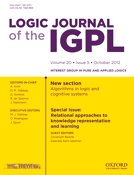
LOGIC JOURNAL OF THE IGPL
Catalyzing Ideas for the Future of LogicLOGIC JOURNAL OF THE IGPL, published by Oxford University Press, stands as a prominent outlet for scholarly work in the field of logic and philosophy. With its ISSN 1367-0751 and E-ISSN 1368-9894, this journal has been a pivotal platform since its inception, covering critical developments in logical theory, methodology, and applications as well as fostering interdisciplinary dialogue with philosophical inquiries. The journal's impressive ranking in the 2023 Scopus metrics, placing it in the 76th percentile for Mathematics - Logic and categorized in Q2 in Philosophy, underscores its significant impact and relevance. Researchers, professionals, and students alike will benefit from its rich repository of innovative ideas and perspectives, with access options that afford a greater reach to the academic community as well as a commitment to advancing the field until 2024 and beyond. Whether you're exploring the nuances of formal systems or the implications of logic in philosophical contexts, the LOGIC JOURNAL OF THE IGPL offers essential insights that contribute to the ongoing discourse.
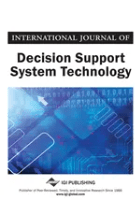
International Journal of Decision Support System Technology
Innovating Solutions for Complex Decision Challenges.International Journal of Decision Support System Technology, published by IGI Global, is a leading publication in the field of decision support systems, bridging the gap between theoretical advancements and practical applications. With its ISSN 1941-6296 and E-ISSN 1941-630X, this journal has been a prominent platform for researchers and professionals since its inception in 2009. Covering a wide range of topics within the realms of Computer Science and Modeling and Simulation, it currently holds rankings of Q3 and Q4, respectively, in the 2023 category quartiles. The journal is committed to disseminating innovative research that enhances decision-making processes through advanced computational techniques. Even without an open access option, it maintains a robust academic presence and aims to foster collaboration among scholars, making it an invaluable resource for students and professionals eager to stay at the forefront of technology and decision-making methodologies. With a focus on accessibility and relevance, the International Journal of Decision Support System Technology continues to shape the future of decision support research.
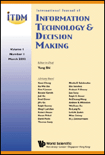
INTERNATIONAL JOURNAL OF INFORMATION TECHNOLOGY & DECISION MAKING
Elevating Decision-Making Through Cutting-Edge IT ResearchINTERNATIONAL JOURNAL OF INFORMATION TECHNOLOGY & DECISION MAKING, published by WORLD SCIENTIFIC PUBL CO PTE LTD, stands as a premier platform in the realm of computer science, focusing particularly on the intersection of information technology and decision sciences. Established in 2002, the journal has consistently published high-quality research, now recognized as a Q1 journal in Computer Science (miscellaneous) as of 2023, ranking 15th out of 133 in its category, which underscores its excellence and influence in the field. Although it does not currently offer Open Access options, the journal remains accessible to a broad audience of researchers, professionals, and students who seek to enhance their understanding of innovative decision-making methodologies powered by information technology. With an emphasis on interdisciplinary collaboration, this journal is dedicated to advancing theoretical and practical knowledge, making it an essential resource for anyone looking to stay at the forefront of technology-driven decision-making processes.

JOURNAL OF MULTIPLE-VALUED LOGIC AND SOFT COMPUTING
Advancing Logic, Empowering Computation.Journal of Multiple-Valued Logic and Soft Computing, published by Old City Publishing Inc, is a dedicated forum for advancing the fields of logic and soft computing. Since its inception in 2003, this journal has positioned itself as a valuable resource for researchers, professionals, and students interested in the complex interplay between multiple-valued logic systems and computational methodologies. With a broader reach into theoretical computer science, the journal is categorized in the Q4 quartiles across key areas, showcasing its role in disseminating relevant research despite its current position. This peer-reviewed publication silos essential discussions and breakthroughs that serve as a foundation for ongoing innovation in logic and computing theories. Though not currently open access, the journal continues to attract critical contributions that underscore its commitment to advancing knowledge in mathematical logic and software development through its effective symposium-like format, promoting collaboration among various stakeholders in the scientific community.
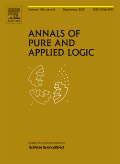
ANNALS OF PURE AND APPLIED LOGIC
Fostering Innovation in the Realm of LogicANNALS OF PURE AND APPLIED LOGIC is a premier academic journal published by Elsevier, specializing in the foundational aspects of logic since its inception in 1974. With a strong commitment to disseminating original research, the journal focuses on both pure and applied logic, making significant contributions to the fields of mathematics and computer science. The journal is recognized for its rigorous peer-review process and is currently ranked Q1 in Logic, reflecting its status among the top-tier publications in the discipline. Researchers will find valuable insights and advancements in logical theory and practice in its pages, while the journal's Scopus ranking further positions it strategically within the mathematical logic community. Although it is not an open-access publication, it offers convenient access options for institutions and subscribers, ensuring a wide reach for groundbreaking findings. The ANNALS OF PURE AND APPLIED LOGIC continues to be an essential resource for professionals, students, and academics alike, facilitating a deeper understanding of logical frameworks and their applications.

Intelligenza Artificiale
Fostering Collaboration in AI ScholarshipIntelligenza Artificiale is a prominent academic journal dedicated to advancing the field of artificial intelligence, published by IOS PRESS, a renowned publisher in the scientific community. Based in the Netherlands, this journal's ISSN is 1724-8035 and its E-ISSN is 2211-0097. With a current impact factor that reflects its relevance in the scholarly landscape, it operates in the Q2 quartile of the Artificial Intelligence category as of 2023, which ranks it notably at #200 out of 350 within its field according to Scopus data. The journal provides a valuable platform for researchers, professionals, and students to disseminate and access cutting-edge findings from 2018 to 2024, focusing on the innovative applications and theoretical developments in artificial intelligence. With its commitment to fostering academic dialogue and collaboration, Intelligenza Artificiale is essential for anyone looking to stay at the forefront of AI research and practice.

Judgment and Decision Making
Pioneering Research in the Art of Decision MakingJudgment and Decision Making is a premier journal published by Cambridge University Press, focusing on the interdisciplinary study of decision-making processes across various fields. With its Open Access policy since 2006, this journal is committed to promoting the dissemination of innovative research that advances our understanding of the cognitive and emotional factors influencing judgment and choice. As reflected in its impressive impact factor, Judgment and Decision Making holds prominent positions in prestigious categories such as Applied Psychology (Q2), Decision Sciences (Q1), and Economics and Econometrics (Q1), ensuring that it remains a vital resource for researchers and practitioners alike. Published in the United States, it covers diverse methodologies and practical applications, making it an essential venue for scholars aiming to contribute to and engage with current debates and advancements in decision-making theory and practice. With a convergence of insights from 2008 to 2024, this journal provides an invaluable platform for nurturing collaboration and dialogue across disciplines.

SOFT COMPUTING
Transforming Theoretical Insights into Practical ApplicationsSOFT COMPUTING is a premier international journal published by Springer, focusing on the interdisciplinary field of soft computing, which includes areas such as fuzzy logic, neural networks, genetic algorithms, and their applications. With an ISSN of 1432-7643 and E-ISSN 1433-7479, the journal is based in Germany and contributes significantly to the advancement of knowledge in its fields, boasting an impressive Scopus ranking that places it in the top echelons of Geometry and Topology, Theoretical Computer Science, and Software categories. In the 2023 category quartiles, it has achieved Q2 rankings in multiple disciplines, reflecting its high-quality research contributions. Though not Open Access, the journal's rigor and relevance to contemporary issues make it a favored resource for researchers, professionals, and students alike. From its inception in 2000 and spanning across the years until 2024, SOFT COMPUTING continues to serve as a robust platform for innovative research and theoretical advancements, making it an essential read for anyone engaged in the rapidly evolving landscape of computational intelligence.